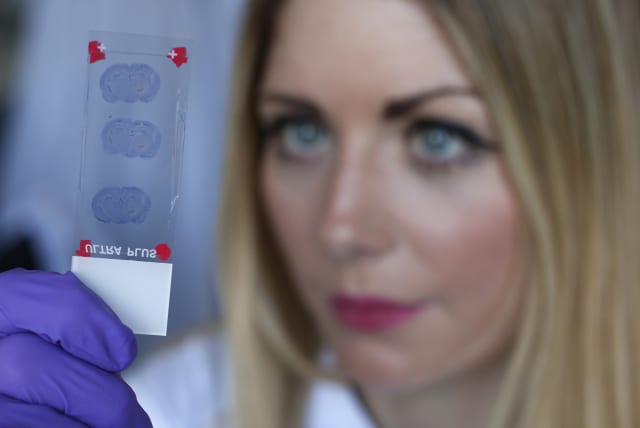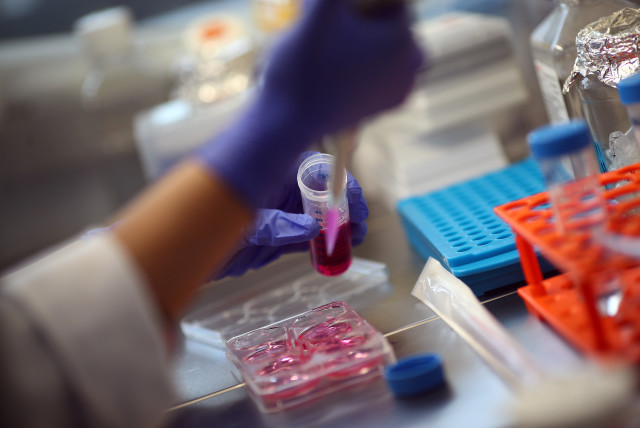Neuroscientists find the importance of dopamine in relationships through rodent study

US study on monogamous rodents shows dopamine is critical for keeping love alive.
If you want to remain in love with your partner, your brain had better keep the dopamine flowing. The same hormone that is behind cravings for sugar, nicotine, and cocaine apparently infuses your brain’s reward center, motivating you to keep that unique bond alive.
But if you are spending time in a businesslike way with an acquaintance at work, the hormone will probably look more like a trickle instead of a flood, according to new research by neuroscientists at the University of Colorado at Boulder.
“What we have found, essentially, is a biological signature of desire that helps us explain why we want to be with some people more than other people,” said senior author and behavioral neuroscience Prof. Zoe Donaldson. The study was just published in the journal Current Biology under the title “Nucleus accumbens dopamine release is necessary and sufficient to promote the behavioral response to reward-predictive cues.”
The nucleus accumbens is part of the neural circuit that controls reward-seeking in response to reward-predictive cues. Dopamine release in the accumbens is essential for the normal functioning of this circuit.
The team didn’t study human couples but prairie voles – cute rodents with greyish-brownish fur on their backs and yellowish fur on their abdomens, a short tail, and small ears. Unusually for mammals, they pick a partner with whom they monogamously share their whole lives and raise their young. Only three to five percent of non-human mammals are monogamous. Because of predators and natural factors, however, their life expectancy is only about two years, and they even experience something like grief when they lose their partner.
By studying voles, Donaldson sought to gain new insight into what goes on inside the human brain to make intimate relationships possible and how we get over it, neurochemically speaking. The new study looked for answers to both questions, showing for the first time that the neurotransmitter dopamine plays a critical role in keeping love alive.
The study done on rodents
“As humans, our entire social world is basically defined by different degrees of selective desire to interact with different people, whether it’s your romantic partner or your close friends,” said Donaldson. “This research suggests that certain people leave a unique chemical imprint on our brain that drives us to maintain these bonds over time.”
For the study, Donaldson and her colleagues used state-of-the art neuroimaging technology to measure, in real time, what happens in the brain as a vole tries to get to its partner. In one scenario, the vole had to press a lever to open a door to the room where her partner was. In another, she had to climb over a fence for that reunion.
Meanwhile a tiny fiber-optic sensor tracked activity, millisecond by millisecond, in the animal’s nucleus accumbens, a brain region responsible for motivating humans to seek rewarding things, from water and food to drugs of abuse. Human neuroimaging studies have shown it is the nucleus accumbens that lights up when we hold our loved one’s hand.
Each time the sensor detects a spurt of dopamine, it “lights up like a glow stick,” explained first-author Anne Pierce, who worked on the study as a graduate student in Donaldson’s lab. When the voles pushed the lever or climbed over the wall to see their life partner, the fiber “lit up like a rave,” she said, “and the party continued as they snuggled and sniffed one another.
In contrast, when a random vole is on the other side of that door or wall, the glow stick dims. “This suggests that not only is dopamine really important for motivating us to seek out our partner, but there’s actually more dopamine coursing through our reward center when we are with our partner than when we are with a stranger,” said Pierce.
In another experiment, the vole couple were kept apart for four weeks -- an eternity in the life of these rodents – and long enough for voles in the wild to find another partner. When reunited, they remembered one another, but their signature dopamine surge had almost vanished. In essence, that fingerprint of desire was gone. As far as their brains were concerned, their former partner was indistinguishable from any other vole. “We think of this as sort of a reset within the brain that allows the animal to now go on and potentially form a new bond,” Donaldson said.
What does the study reflect about human relationships?
This could be good news for humans who have undergone a painful break-up or even lost a spouse, suggesting that the brain has an inherent mechanism to protect us from endless unrequited love, the authors suggested. They stressed that more research is necessary to learn whether results in voles translate to their bigger-brained humans. But they believe their work could ultimately have important implications for people who either have trouble forming close relationships or those who struggle to get over loss – a condition known as prolonged grief disorder.
“The hope is that by understanding what healthy bonds look like within the brain, we can begin to identify new therapies to help the many people with mental illnesses that affect their social world,” Donaldson concluded.
Jerusalem Post Store
`; document.getElementById("linkPremium").innerHTML = cont; var divWithLink = document.getElementById("premium-link"); if (divWithLink !== null && divWithLink !== 'undefined') { divWithLink.style.border = "solid 1px #cb0f3e"; divWithLink.style.textAlign = "center"; divWithLink.style.marginBottom = "15px"; divWithLink.style.marginTop = "15px"; divWithLink.style.width = "100%"; divWithLink.style.backgroundColor = "#122952"; divWithLink.style.color = "#ffffff"; divWithLink.style.lineHeight = "1.5"; } } (function (v, i) { });

